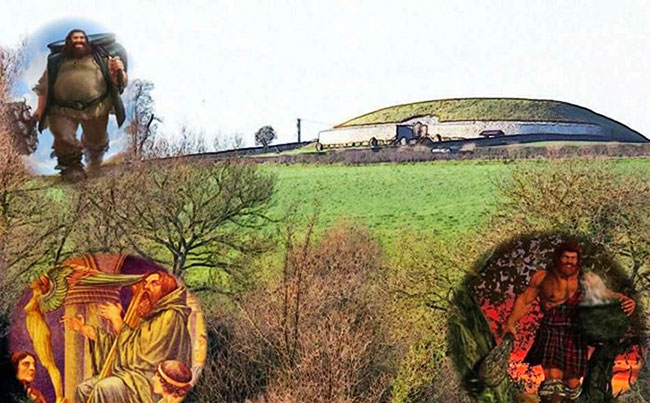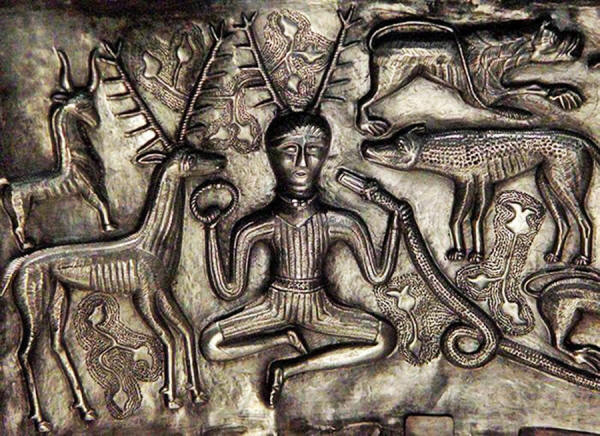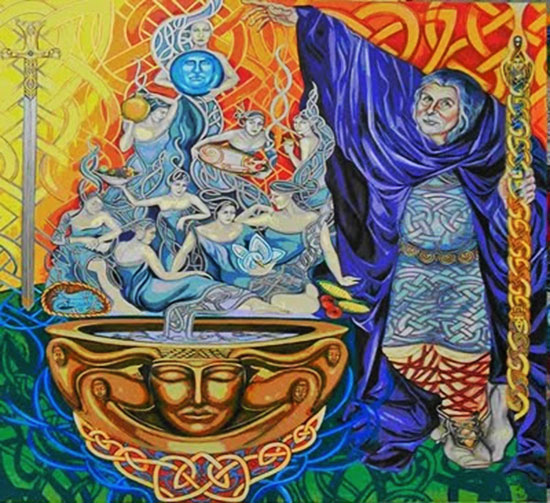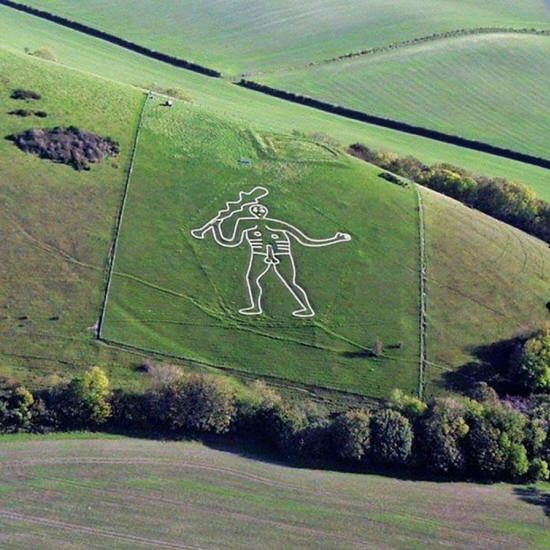|
by Thalia Lightbringer
May 30,
2020
The Dagda was an ancient god of the earth, originally an agricultural god.
When
christianity became dominant in
Ireland, the Dagda became a comical figure, a brute giant
with a huge gut. This was poor treatment of this respected god of
many talents, called the "Good God" or "Shining" in old Celtic
myths.
In the
Cath Maige Tuired, he reveals that
his true name is Fer Benn ("horned man"), like the
horned god of the forest, Cernunnos. But Dagda continues,
relating that his complete name is Fer Benn Bruach Brogaill
Broumide Cerbad Caic Rolaig… and it goes on! Gundestrup antlered figure, derivative work Public Domain - CC BY-SA 3.0
This makes it tempting to compare him to the Norse god Odin, but the Dagda is more like warrior Thor, the Thunderer, with his mighty weapon.
One of Dagda's titles is Ruad Rofhessa (mighty red one or noble lord of great knowledge), giving him an association with the druids.
This also shows that far
from being a figure to laugh at, he was considered extremely wise
and powerful. Other important titles were Samildanach
(meaning he had many skills or talents) and Cera (indicating
he was a creator god).
But the Dagda was not their first leader.
The tradition of those times was that the leader had to be physically perfect.
It was a short rule.
Bres attempted to retake the kingship, teaming up with the Fomorian Balor of the Evil Eye.
Before the great battle, Nuada asked his people what powers they would bring to his aid. After listening to them all, the Dagda claimed he would wield all of those powers at once himself.
Then all exclaimed he was
the "Good God" (Dagda), which is how he gained that name.
Then the Morrigan gave
Dagda a prophecy of the Fomorian battle plan, predicting victory
over Balor.
The Dagda had a huge club which could kill nine men in one blow and could restore life with the other end. This great club of wrath (lorg mor or lorg anfaid) took out many enemies.
However, in this battle, Nuada was beheaded and killed. Lugh then became the leader.
The Dagda possessed
another of the great treasures, the Cauldron of Plenty, which is
never dry or empty of food and could also be used to restore life to
fallen warriors.
Dagda, and the Cauldron of Plenty by Jordan Brito
Public Domain - CC BY-SA 4.0
The Dagda possessed another of the great treasures, the Cauldron of Plenty (the coire ansic, or cauldron which is never dry), sometimes referred to as the Undry.
The Dagda was called a god of music because he played a magical harp called the Uaithne, also known as "the Four Angled Music," made of oak and richly ornamented with jewels.
The Dagda was said to be able to control time and the seasons with Uaithne.
This was how he stopped the sun when his lover Boann was pregnant with his son Angus Og.
When Fomorians stole the harp, the Dagda discovered the keep where it hung upon a wall.
The harp magically flew
to his hand when he called it, killing nine men. Dagda then used
Uaithne, causing his enemies to cry and laugh uncontrollably, then
to fall asleep and dream.
The Dagda is also linked with several other places.
The
Cerne Abbas Giant in Dorset,
England is thought to depict him. The Cerne Abbas Giant by PeteHarlow
Public Domain - CC BY-SA 3.0
Some sources link him
with the harvest gods Crom Cruach and Crom Dubh.
He was a god-like Lugh with an unbelievable number of skills and powers.
He was one of the
greatest of the Tuatha De Danann and deserves to be portrayed with
respect...
|





